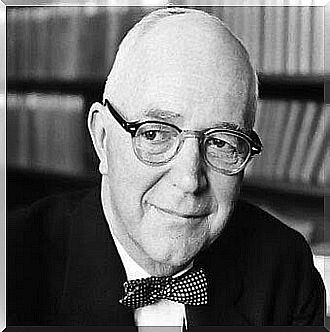Gordon Allport: Biography Of The Father Of Personality Psychology

Gordon Allport was an American psychologist who went down in history to lay the foundations of personality psychology. His theory of personality is considered to be one of the first humanistic theories, due to his conception of the human being as an autonomous entity with free will. For Allport, we are not only driven by our instincts and our impulses. On the other hand, he also argues that the past does not rule us.
In addition, he presents his work in a very didactic way, which is quite enjoyable, interesting and appealing to the general public. Without a doubt, an author worth reading by experts in psychology. But also by anyone who wishes to quench their thirst for knowledge and concerns related to the field of psychology.
In addition to his theory on personality, Gordon Allport brought very important psychological knowledge in the areas of motivation, prejudice and religion of individuals. So his heritage is very wide and he has become a really interesting figure in the field of psychology. Throughout this article, we will reveal some of the peculiarities and contributions of this psychologist. Are you accompanying us to find out?
Early life
Gordon Allport was born in Indiana in 1897. His family then moved to Ohio when Gordon was still very young. His father was a doctor, but he worked at home. Therefore, Gordon Allport and his brothers have been involved in the world of medicine since childhood. This approach to medicine has sparked an interest in studies and in particular in psychology.
However, his first steps in university life were unrelated to medicine or psychology. Allport has degrees in economics and philosophy, although he has always shown a great interest in social psychology. Allport has lived a fairly calm, peaceful life without too many surprises.
Finally, he trained as a psychologist at Harvard and, after this period, made a trip to Europe, more precisely to Vienna. This trip is one of the most significant events of his life, as it resulted in an approach of Sigmund Freud. Although this meeting does not seem to have aroused in Allport a great admiration for the father of psychoanalysis, but rather the reverse. Gordon Allport, like many other psychologists who formed the humanist school, considered Freud’s theories to be very compelling.

His work
Upon his return from Europe, he began working as a professor of psychology at Harvard University, a position he held until his death. During his stay, he served on numerous committees and taught courses that were truly innovative for his time. Gordon Allport was an editor, faculty member, and in 1939 he was elected president of the American Psychological Association.
He has published several books in which his main research is collected. He has received numerous awards in recognition of his work and contributions to the field of psychology. The American Psychological Association has awarded him the APA Award for Distinguished Scientific Contributions to Psychology , a coveted prize in the profession.
Gordon Allport placed a strong emphasis on the motivations and conscious thoughts of individuals, sparking great interest in personality development. Allport tried to find a balance between the main currents of the moment. The behaviorism was incomplete, superficial; while psychoanalysis was too complex. Following the meeting with Freud, the interest in developing his own theory grew stronger.
Contribution to psychology
Gordon Allport is known to have a great influence in many areas of psychology, his trait theory being particularly well known. This theory determines that every human being has hundreds of traits. He classified 4,500 words that define a person and grouped them into three levels:
- ?? Cardinal trait : it is the dominant trait of a person and it is the one that shapes the identity, emotions and behaviors of the individual.
- ?? Central trait : these are main traits, although not dominant. They are inherent in most people and lay the foundation for personality and actions.
- ?? Secondary trait : these are private characteristics specific to each individual. Often, they are only disclosed confidentially and under certain conditions.

Gordon Allport’s Legacy
In addition to his trait theory, he identified genotypes and phenotypes; in other words, the internal and external conditions that motivate a person’s behavior. In his work Personality: A Psychological Interpretation (1937), he defines personality as “the dynamic organization within the individual of those psychophysical systems which determine their adaptation to the environment”.
He also pointed out that this personality is different in each individual. Allport was also interested in the nature of the will, motivation and determination of the people. He stressed the importance of learning, behaviors and thoughts of an individual which are the product of a whole life story. That is to say that what an individual thinks at a time is the result of his past, but also of his present.
Gordon Allport promoted the “interdisciplinary movement” at Harvard University, where the Department of Social Sciences was born, headed by Talcott Parsons. He also criticized Freud’s psychoanalysis and radical behaviorism. In turn, he developed the concept of propium. It is the part of the personality that seems to play an intimate and central role for the person.
He also touched on other issues such as prejudice and religion. Allport conducts an in-depth analysis of the issue of bias. It illustrates and deepens the discrimination suffered by Jews and African Americans. All of this can be found in one of his most recognized works: The Nature of Prejudice .
Eventually, after a life devoted to study, Allport passed away on October 9, 1967. After his death, he left an undeniable legacy in the field of psychology. Considered one of the pioneers of humanistic psychology, Allport is undoubtedly an important figure of the 20th century.










